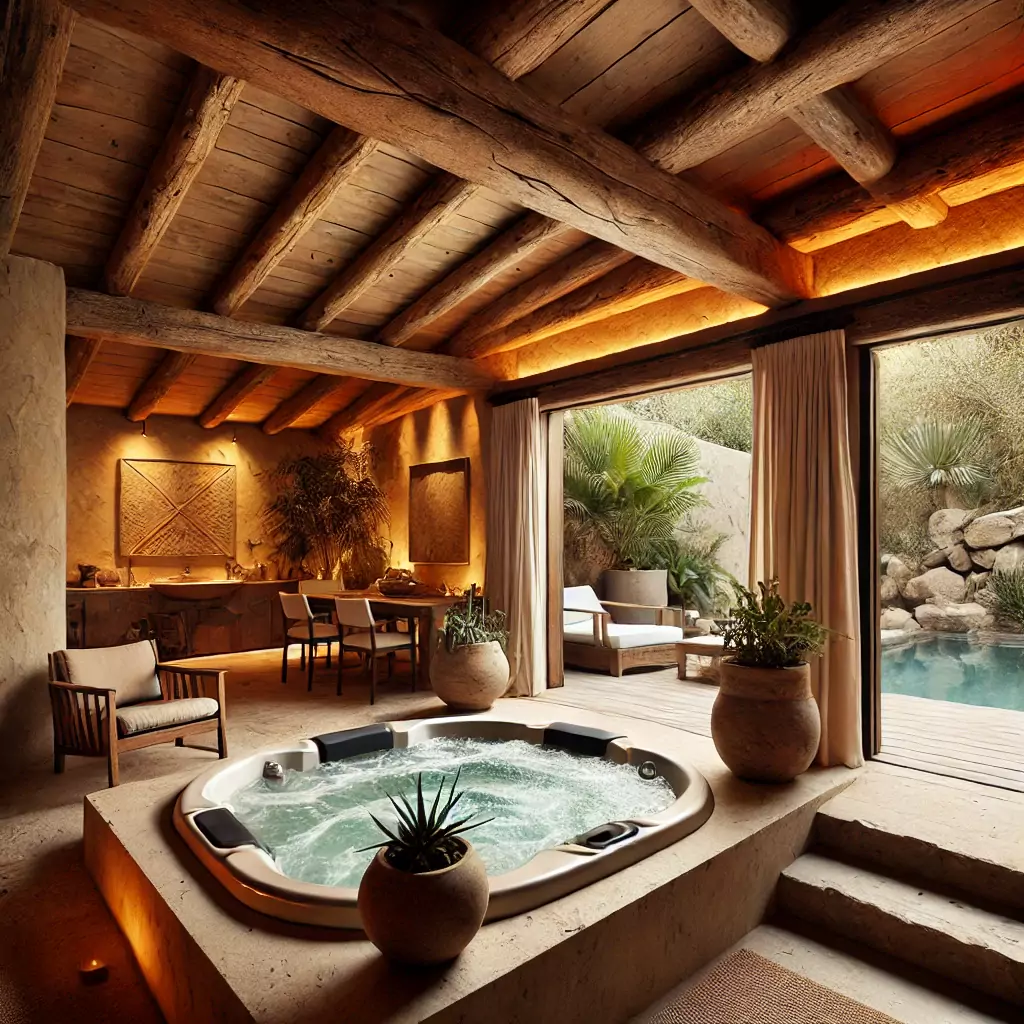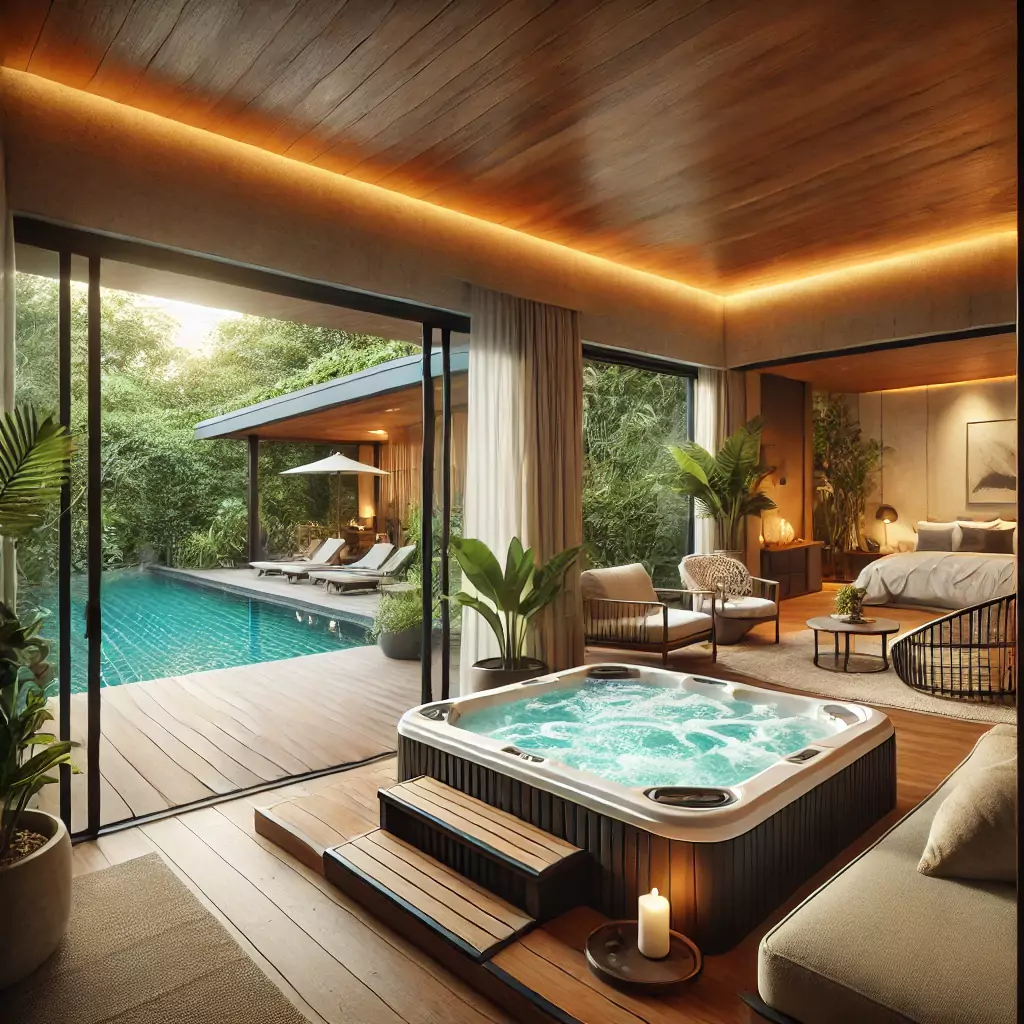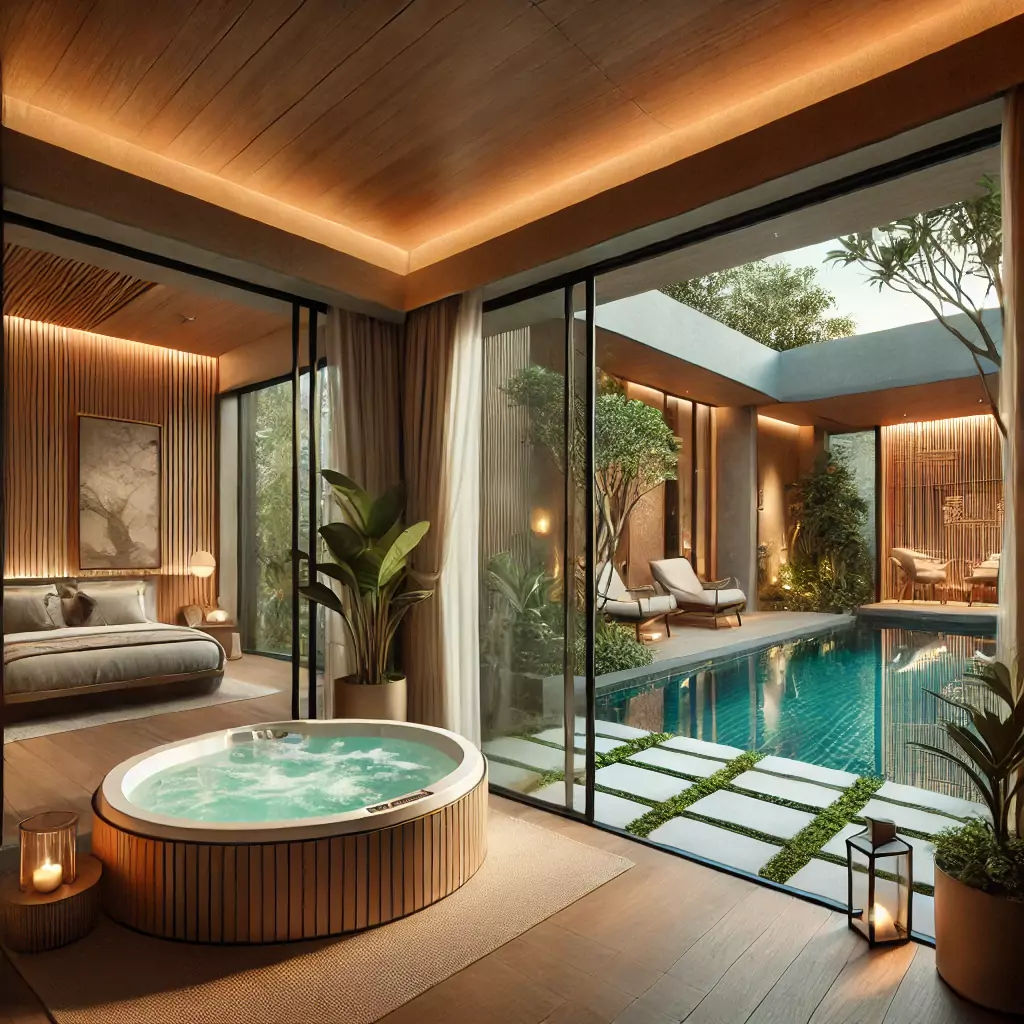Hot Tub to Pool
What is the Best Option for Your Home?
Hot Tub to Pool: Benefits for Well-being and Health
When it comes time to choose between a Hot Tub to Pool, many people first consider the benefits these installations can bring to their well-being and health. Both options offer a wide range of advantages that go beyond simple relaxation or aesthetic enjoyment. Whether you prefer a Hot Tub to Pool, it’s important to understand how each can contribute to improving your quality of life.
One of the most common reasons people choose a Hot Tub to Pool is its ability to reduce stress and promote relaxation. The simple act of immersing oneself in water creates a sense of tranquility that helps release the tension accumulated throughout the day. In particular, a Hot Tub has the advantage of jets that provide localized relief to the muscles and promote the release of endorphins, known as the “happiness hormones.” This makes the Hot Tub an excellent choice for those seeking deep relaxation therapy.
On the other hand, a Pool offers a more active form of relaxation, allowing for swimming and free movement, which also effectively contributes to reducing stress levels.

Both a Hot Tub to Pool can be equally beneficial for circulation and cardiovascular health. In the case of a Pool, swimming is one of the most complete exercises available. While swimming, the heart is stimulated, which strengthens the cardiovascular system and improves blood circulation. Additionally, being a low-impact exercise, it is ideal for people of all ages and fitness levels.
As for the Hot Tub, it also has positive effects on circulation. The hot water dilates the blood vessels, improving the flow of blood throughout the body. This can be especially helpful for people with circulation problems or chronic pain.
The combination of heat and massage in a Hot Tub is a powerful tool for promoting cardiovascular health without the need for intense physical effort.
Another important advantage, whether you choose a Hot Tub to Pool, is the relief of muscle and joint pain. The buoyancy of the water reduces pressure on the joints, which can be very helpful for those suffering from arthritis or joint injuries. In a Pool, the water acts as a natural support, allowing for exercises without putting the joints at risk.
On the other hand, the Hot Tub, with its hot water and massage jets, can quickly relieve muscle and joint pain by relaxing tense muscles and reducing inflammation. This makes the Hot Tub a preferred option for those seeking immediate relief from physical ailments.
Regular contact with water, whether in a Pool or Hot Tub, has a positive impact on mental health. The time spent in the water can improve mood, reduce symptoms of anxiety, and promote better sleep. Additionally, in a Pool or Hot Tub, the body experiences a feeling of weightlessness that relieves both the mind and body, contributing to overall well-being.
Hot Tub to Pool: Factors to Consider Based on Available Space
When deciding between a Hot Tub to Pool for installation in your home, one of the most important factors to consider is the available space. Both a Hot Tub and a Pool require specific conditions for installation, and the size of the space you have will determine which option is best for you. Choosing correctly between a Hot Tub to Pool will not only optimize the use of space but also ensure that you fully enjoy their benefits.
First, it’s crucial to evaluate the available area in your home or garden. If you have a large space, Pools are often a very attractive option, especially if you’re looking for a place to engage in physical activities like swimming or simply enjoy a refreshing bath with family. However, Pools require a significant amount of square footage, not only for the installation of the pool itself but also for circulation areas, maintenance spaces, and in some cases, lounge or solarium areas.
Moreover, depending on the location of your home, local regulations may require minimum distances between the Pool and adjacent structures, which will also impact the amount of space needed. Similarly, you might be fortunate enough not to have to choose between a Pool or a Hot Tub and may be able to acquire both.
On the other hand, if the available space is more limited, a Hot Tub can be the perfect solution. Hot Tubs have the advantage of being able to be installed both indoors and outdoors, and they take up much less space than a Pool. There are compact Hot Tub models that can fit into small terraces, patios, or even large bathrooms, making them a highly versatile option.
While they require less space than a Pool, it’s important to ensure that the chosen area has the proper support, especially if the Hot Tub will be installed on a terrace or elevated platform, as the weight of the water and people could be considerable.
Another aspect to consider when choosing between a Hot Tub to Pool based on the available space is the intended use. Pools are ideal if you want a place to exercise, socialize with friends and family, or enjoy the summer with outdoor activities.
If the space allows, you could also think about different types of Pools, such as infinity pools or designer pools, which are not only functional but also aesthetically impressive.

On the other hand, a Hot Tub, although smaller, focuses more on relaxation and well-being. Hot Tubs are designed to provide a therapeutic hydrotherapy experience, ideal for unwinding after a long day or for those looking to relieve muscle and joint pain. If you’re looking for a place to relax in a smaller space, a Hot Tub is the more suitable option.
In addition to the size of the space, it’s also crucial to consider maintenance. Pools require more dedication in terms of cleaning and maintenance due to the large volume of water they contain, and the necessary equipment may require a technical room or additional space. On the other hand, Hot Tubs, while still needing care, are generally easier to maintain and take up less space both for use and for their equipment.
Cool Off and Enjoy with the Lylting Inflatable Pool
💧 Large & Spacious: This inflatable pool is perfect for family fun or relaxing in the backyard. It provides ample space for everyone to enjoy a refreshing swim or splash around.
🌿 Durable & High-Quality: Made with high-quality, puncture-resistant material, this pool is designed to last throughout the summer, offering endless hours of enjoyment.
🌟 Quick & Easy Setup: With the included pump, setting up the pool is a breeze, so you can spend more time enjoying the water and less time on installation.
🎁 Perfect for Outdoor Fun: Whether you’re hosting a summer party or just relaxing by the pool, this inflatable pool is a must-have for your backyard.
Buy now and make a splash with the Lylting inflatable pool – your ultimate backyard escape!
Hot Tub to Pool: Cost and Maintenance Comparison
When you decide to install a Hot Tub to Pool in your home, one of the most important factors to consider is the cost and maintenance each option involves. Both alternatives offer great benefits for enjoyment and relaxation, but their initial and long-term maintenance costs can vary significantly. Choosing between a Hot Tub to Pool depends not only on your personal preferences but also on the budget you’re willing to invest and the effort you’re prepared to dedicate to its care.
Starting with installation costs, Pools are usually a considerably larger investment compared to Hot Tubs. A pool involves excavation, the installation of filtration and pumping systems, as well as the construction of additional structures such as surrounding edges and resting areas. Additionally, depending on the type of pool, the costs can vary even more. For example, a built-in pool can be significantly more expensive than a prefabricated or removable pool.
Pool prices can range from several thousand euros, depending on size, materials used, and additional accessories such as lighting or heating systems.

On the other hand, a Hot Tub generally has a lower installation cost. Portable models, in particular, are more affordable than pools and require less installation work, as there is no need for excavation or building complex structures. The price of a Hot Tub can vary depending on the model, size, and additional features such as hydrotherapy systems or temperature control. However, in general, Hot Tubs tend to be a more accessible option in terms of initial costs.
When it comes to maintenance costs, the differences are also significant. A pool requires constant maintenance to ensure that the water is clean and free of bacteria. This involves the regular use of chemicals such as chlorine, algaecides, and pH stabilizers. Additionally, the filtration system must run for several hours a day to keep the water in optimal conditions.
Regular cleaning of the pool’s floor and ensuring there is no accumulation of leaves or debris is also necessary. This maintenance can be costly, not only because of the chemicals but also due to the energy consumption of the filtration system and the occasional need to hire professional maintenance services.
In contrast, the maintenance of a Hot Tub is usually simpler and less costly than that of a pool. While it also requires chemicals to keep the water clean, the amount of water in a Hot Tub is much less than that of a pool, so the use of these products is reduced. Additionally, modern Hot Tubs are equipped with efficient filtration systems that require less operating time, which reduces energy consumption. However, the water in a Hot Tub needs to be changed more frequently, typically every three months, which can lead to a slight increase in water consumption.
Another factor to consider is durability. Pools, especially in-ground ones, can last for decades if properly maintained, making them a long-term investment. Hot Tubs, although also durable, have a shorter lifespan, especially if they are portable models. However, the difference in initial and ongoing maintenance costs over time may offset this difference in durability.
Hot Tub to Pool: The Impact on Your Property Value
Installing a hot tub or pool on a property can have a significant impact on its market value. Both options offer benefits that can increase a home’s appeal, but the type of installation, its maintenance, and geographic location play a crucial role in determining how much the property’s value will increase. When considering whether to add a hot tub or pool, it is important to evaluate how these improvements will affect long-term value, especially if you plan to sell your home in the future.
First, the impact of a pool on property value can be considerable, but it varies depending on the market type. In areas where the climate is warm for most of the year, such as regions in southern Europe, a pool can be a highly desirable feature. Potential buyers in these areas often view the presence of a pool as an advantage, especially if the property has enough outdoor space and if the pool is well-maintained and updated. In such cases, a well-designed and well-maintained pool can increase the property’s value by up to 7% or more, according to real estate studies.
However, in colder or temperate climates, the impact of a pool on property value may be less. In regions where the use of a pool is limited to the summer months, some buyers may see the pool as a burden due to the ongoing maintenance and costs it incurs. This is particularly true if the pool requires repairs or significant updates. Therefore, the positive impact on value may be more modest in these areas, or even nonexistent if buyers feel that the maintenance cost outweighs the limited benefit of pool use.
The installation of a hot tub to pool in a property can have a significant impact on its market value. Both options offer benefits that can increase the appeal of a home, but the type of installation, its maintenance, and the geographic location play a crucial role in determining how much the property’s value increases. When considering whether to add a hot tub to pool, it is important to evaluate how these improvements will affect the long-term value, especially if you plan to sell your home in the future.
First, the impact of a hot tub to pool on a property’s value can be considerable, but it varies depending on the market type. In areas where the climate is warm for most of the year, such as in regions of southern Europe, a hot tub to pool can be a very desirable feature. Potential buyers in these areas often view a hot tub to pool as an advantage, especially if the property has ample outdoor space and the pool is well-maintained and updated. In these cases, a well-designed and maintained hot tub to pool can increase the property value by up to 7% or more, according to real estate studies.
However, in cooler or temperate climates, the impact of a hot tub to pool on property value may be lower. In regions where the use of a hot tub to pool is limited to the summer months, some buyers may see the pool as a burden due to the ongoing maintenance and costs involved. This is particularly true if the pool requires major repairs or updates. Therefore, the positive impact on value may be more modest in these areas, or even nonexistent if buyers feel that the cost of maintenance outweighs the benefit of limited use of the pool.

Another aspect to consider is maintenance. Although both a hot tub to pool and a jacuzzi require maintenance, the upkeep of a hot tub to pool is generally more expensive and labor-intensive. Buyers may perceive this as a drawback, which could reduce the positive impact on the property value. In contrast, a jacuzzi, due to its smaller size and lower maintenance costs, is easier to care for, making it more appealing to those looking for a luxury option without committing too much time or resources.
Thank you for reading this article on hot tub to pool. If the jacuzzi is the winning option between a hot tub to pool and a jacuzzi, and you wish to discover more information on well-being, design, and the best options for your home, we invite you to explore our website. Don’t forget to visit our blog section for more interesting and useful content. We look forward to seeing you!
